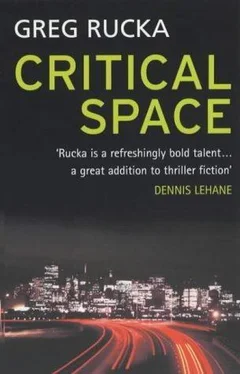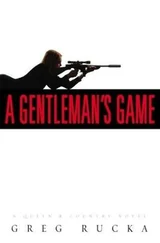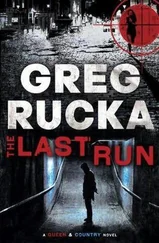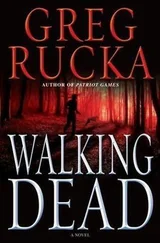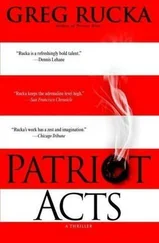Greg Rucka - Critical Space
Здесь есть возможность читать онлайн «Greg Rucka - Critical Space» весь текст электронной книги совершенно бесплатно (целиком полную версию без сокращений). В некоторых случаях можно слушать аудио, скачать через торрент в формате fb2 и присутствует краткое содержание. Жанр: Триллер, на английском языке. Описание произведения, (предисловие) а так же отзывы посетителей доступны на портале библиотеки ЛибКат.
- Название:Critical Space
- Автор:
- Жанр:
- Год:неизвестен
- ISBN:нет данных
- Рейтинг книги:4 / 5. Голосов: 1
-
Избранное:Добавить в избранное
- Отзывы:
-
Ваша оценка:
- 80
- 1
- 2
- 3
- 4
- 5
Critical Space: краткое содержание, описание и аннотация
Предлагаем к чтению аннотацию, описание, краткое содержание или предисловие (зависит от того, что написал сам автор книги «Critical Space»). Если вы не нашли необходимую информацию о книге — напишите в комментариях, мы постараемся отыскать её.
Critical Space — читать онлайн бесплатно полную книгу (весь текст) целиком
Ниже представлен текст книги, разбитый по страницам. Система сохранения места последней прочитанной страницы, позволяет с удобством читать онлайн бесплатно книгу «Critical Space», без необходимости каждый раз заново искать на чём Вы остановились. Поставьте закладку, и сможете в любой момент перейти на страницу, на которой закончили чтение.
Интервал:
Закладка:
"Shut off the alarm or you're fucking dead," I said in German.
He nodded vigorously, already straining to reach the keypad, and I waited while he punched in the numbers, six of them. The keypad had an LCD and three lights, and right now one of the lights was bright red, and getting angry. Then the last number went in and the pad chirped and the red light went out, and another, green, came on.
The man with my gun against his neck began whispering a rapid and frightened string of German, and he strained to see me without turning his head, his eyes white and wide. I pulled the gun from his neck and then clubbed him with the barrel, which was bad for the gun but worse for him. He went down on his knees, caught himself on his hands. I saw blood seeping through the thinning black hair at the back of his skull, and before I looked at it too long and really started thinking about what I was doing, I hit him again.
The man fell to the floor, still.
I dropped a knee onto his back, holding the Browning out, sighting down the hallway, into the darkness of what I took to be the kitchen, but there was nothing, no movement, no noise. With my free hand I felt for his pulse, got one off the carotid, strong and rapid. Assuming that the blows to his head didn't cause a cerebral edema or a sudden clot, he'd be okay.
The carpet in the hall was thick and silk and looked like it had come from Turkey, or maybe farther in Asia, and when I set the gun on it there was no noise. From the left pocket of my coat I removed the duct tape and wound it rapidly around the man's wrists, binding them behind his back. I did the same with his feet, then pulled off his necktie and gagged him with it, tight. I didn't want to use the duct tape and risk him suffocating, but I didn't want him playing possum and raising an alarm as soon as I moved away. I probably didn't need to worry, but it made me feel like I hadn't hit him all that hard, wasn't being all that callous, if I kept telling myself he wasn't truly unconscious.
But he was, and when I rose, he didn't move.
I put the duct tape back in my jacket and listened again. From above I heard the sound of water as it began running through pipes. Past that, the only noises came from a grandfather clock at the end of the hallway and the muted slap of Lake Geneva as it met the shore outside.
My shoes silent on the expensive rug, I started down the hall, looking for my target.
I'd given it twenty minutes after Moore left before heading down myself, checking out of the room and then catching a cab back to the Burns and falling into bed. At six I was up again, and by seven I was at Heathrow with a Swissair ticket to Geneva. I was still moving as Dennis Murphy, and passed through passport control without the slightest hitch. Outside, I caught the train into the city, a ride of seven minutes that let me off in the downtown of one of the world's nerve centers. The last time I'd been through Switzerland I'd been in my teens, with a EurailPass in my pocket and a list of youth hostels in my hand. The places I'd stayed had been utterly without frills but absolutely clean. This time I stayed at the Intercontinental Hotel on Petit-Saconnex, a huge and modern high-rise, where everything was just as clean as the last time, but far more welcoming. My room had soft beige carpet and the bedspread was the color of brass, and out the window I could see the lake and the Alps and the city.
The cache was actually twenty-nine kilometers outside of Geneva, near Nyon, on a small boat berthed at one of the tiny marinas that dotted the shores of the lake. I caught a cab and managed to convey to the driver where I needed to go with a combination of English and French, and when we reached our destination it took me another three minutes to make him understand that I wanted him to wait for me. There were perhaps sixteen boats moored to a floating pier that jutted out over the clear and cold water, the access from the road blocked by a token gate, the kind of structure that is more a polite request to keep a distance than a warning to steer clear. I walked out over the water, not seeing anyone, counting berths, until I found the craft I wanted.
The boat was named La Petite Marie, and the deck was clear and empty. The cabin door was held shut with a combination lock, and for what felt like a lifetime I stared at it, racking my brain for the numbers Alena had given me, the numbers she'd told me I mustn't write down, that I had to memorize. It took me three tries before I got it right, and the relief I felt when the lock snapped open left me wanting to laugh.
The boat had been built to hold two people intimately at best, and the interior smelled of musty fabric and mildew, and something vaguely fruity, as if the last occupant had eaten an orange and forgotten to throw out the skin. A cushioned bench ran along one side of the cabin and against the far wall, where it met with a narrow closet. Pulling the cushions back revealed cabinets built into the side of the boat, and in the one nearest the prow on the starboard side I found a powder blue grip made of vinyl. I took the bag, replaced the cushions, and locked the door on my way out.
A boy, perhaps fourteen years old, stood at the end of the pier as I came back, and he watched me approach. When I hopped the fence again he asked me a question in German, and I answered in the best French I could manage that I didn't understand. He gestured out to the La Petite Marie, asking another question, and I shrugged and grinned and climbed into the cab. The boy watched as we departed, and as the car turned to take me back to Geneva, I saw him walking out on the pier, presumably making for the boat.
I doubted that the kid worked for Interpol or even the CIA, but all the same I had the cab drop me off at the headquarters for the International Red Cross, then walked a couple blocks until I found an open clothing boutique. I purchased a pair of leather gloves that weren't so thick that they would impede my manual dexterity, then got directions to an English language bookstore on Rue Versonnex, where I purchased a French-English phrase book. I made my way back to the hotel, and was in my room, behind its locked door, before I ever opened the grip.
Alena had cached two pistols – a Browning and a Beretta – with ammunition for each. The money came to almost thirty thousand in Swiss francs, with another ten thousand in dollars. There were also papers for Genevieve Pontchardier, a young woman who lived in Bern and worked for one of the banks there, as well as a mix of toiletries and clothes. There were also binoculars and a thirty-five millimeter camera. Except for the weapons and the cash, it was the kind of bag someone might pack for a weekend excursion along Lac Leman.
I burned Genevieve Pontchardier's papers over the toilet, then moved everything to my bag, except for the money. This I put into three hotel envelopes, then put the envelopes inside my coat. I dumped the grip in the trash and went down to the lobby. Most of the staff spoke English fluently. The concierge smiled knowingly when I asked him if he could suggest a discreet bank nearby.
"All of our banks are quite discreet, Monsieur Murphy," he told me, and then he took one of the paper maps of Geneva he kept by his desk, and conscientiously traced out my route for me. "Their English is very good, and you will find them extremely helpful."
I thanked him, then asked if he could suggest someplace for lunch. He could and I enjoyed some of the finest trout I've ever eaten at a restaurant that charged me more for fish than I'd ever paid. Then I went to the bank, and less than an hour later I had my very own numbered account, with a starting balance of thirty thousand Swiss francs and ten thousand American dollars. It was distressingly simple to do. I'd given basic, anonymous information, and then been asked to sign a form declaring that the money I was depositing was, in fact, legally my own. That was pretty much it, and I left wondering if all of the things I'd read about the Swiss tightening their banking laws hadn't been just smoke.
Читать дальшеИнтервал:
Закладка:
Похожие книги на «Critical Space»
Представляем Вашему вниманию похожие книги на «Critical Space» списком для выбора. Мы отобрали схожую по названию и смыслу литературу в надежде предоставить читателям больше вариантов отыскать новые, интересные, ещё непрочитанные произведения.
Обсуждение, отзывы о книге «Critical Space» и просто собственные мнения читателей. Оставьте ваши комментарии, напишите, что Вы думаете о произведении, его смысле или главных героях. Укажите что конкретно понравилось, а что нет, и почему Вы так считаете.
